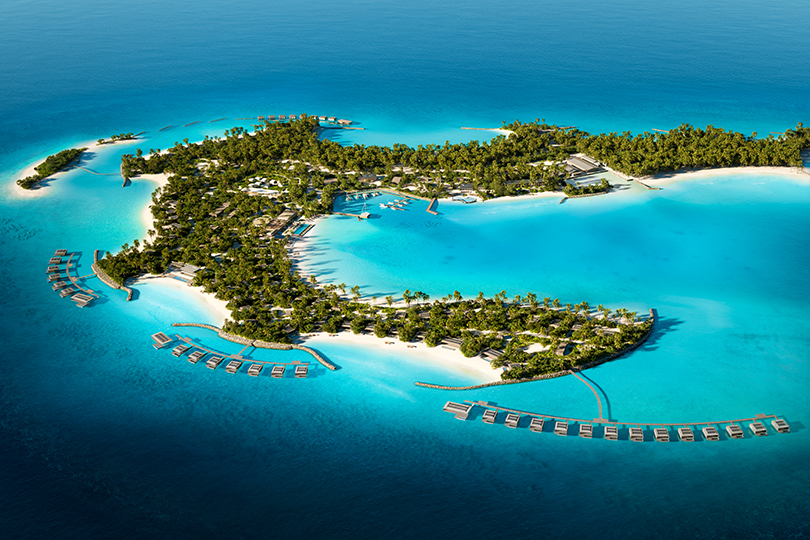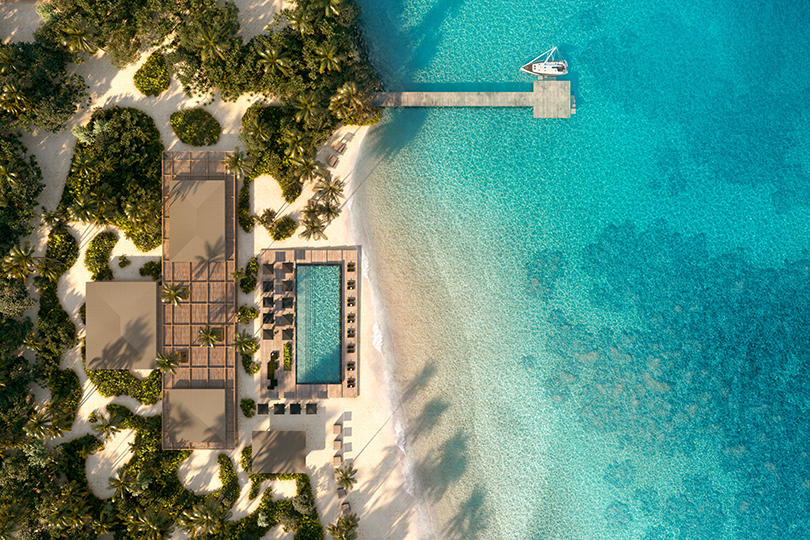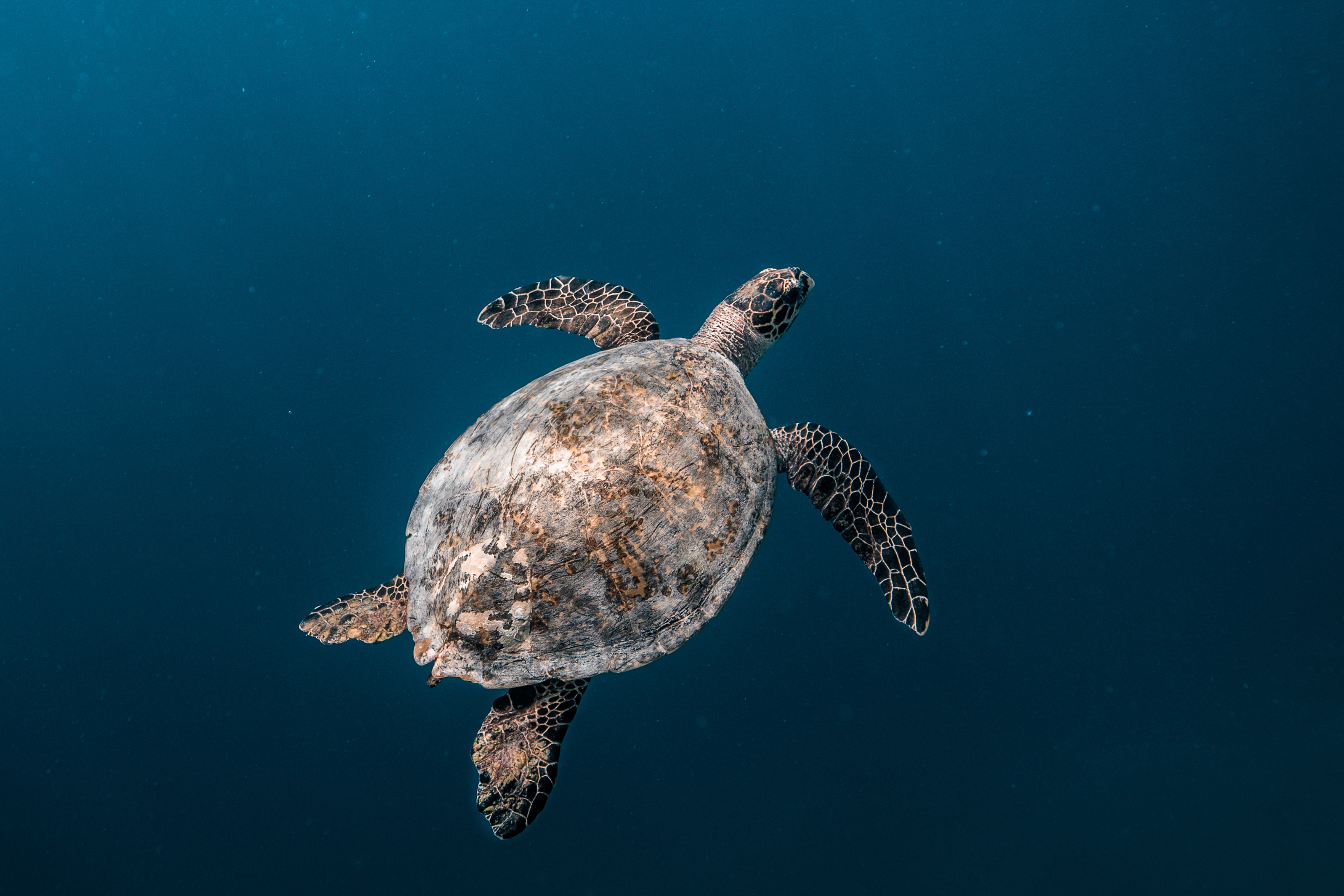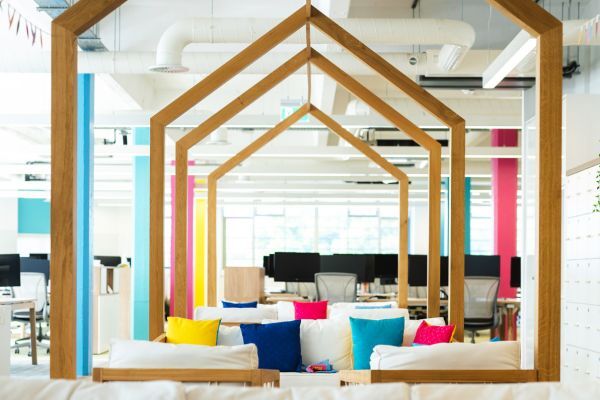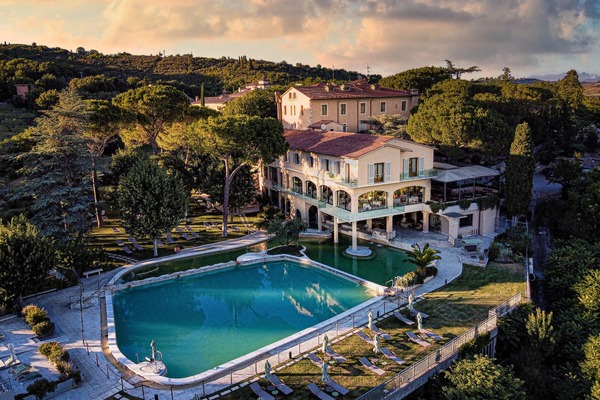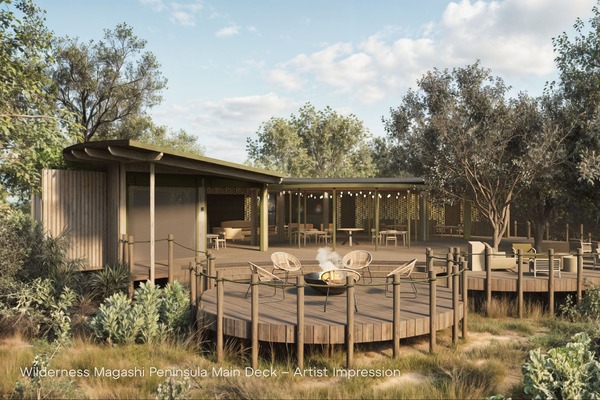Customised vitamins and making models from ocean plastic
It’s about 6pm, and a warm red light glows all around me as I sip a chilled cocktail and inhale some fresh scents made by Haeckels. It’s not quite the Maldives, but it will have to do.
I’m nowhere near the Indian Ocean – I’m sat in my London flat, as is often the case these days. The warm glow comes from a “sunset lamp”, which if you Google, you’ll see has become something of a coronavirus/lockdown phenomenon – almost as uplifting as watching/listening to Jerusalema (388million YouTube views and counting).
The lamp was sent to me on behalf of Patina, Maldives Fari Islands, and the cocktail? Sadly, that wasn’t mixed in a beach bar, but made by my own best efforts with some of the Pensador Mezcal I was sent and some TwoKeys’ pink grapefruit mixer.
And so, until we can get back out to the Maldives, I’ll settle for this combination, and a couple of hours learning about Patina with Nicholas Clayton, chief executive of Capella Hotel Group – which is launching it as a new affluent lifestyle brand – and general manager Marco Den Ouden, live from the resort.
“Capella’s second brand is fundamental to our ability to grow; often developers look to us for alternatives, so it was important for us to have this as an option,” says Clayton on the evening Zoom. “We picked the lifestyle space as it was more future-orientated, as these travellers like new fresh spaces, community-focused ideas and wellness. It’s a brand for the future, and where design is very important. Patina will deliver a full customer experience: we are very much in the experience business.”
That was clear from the effort put into making a virtual introduction to the resort as conducive as possible; Patina, Maldives is certainly likely to be one of the most impressive openings in the country this year, with lucky guests from somewhere in the world able to stay there from 18 May onwards.
Mix and match
It’s the first of three resorts in the Fari Islands project, one of the first luxury multi-hotel concepts in the Maldives, sitting in North Male atoll, a 50-minute boat transfer from the airport.
We all know the country as being famous for its “one island, one resort” proposition, with guests often staying put in one place for the duration of the trip. But this concept connects the dining, lifestyle and entertainment options of three separate resorts, with a fleet of boats shuttling guests around the archipelago – on this first island will also be Fari Marina Village and Fari Beach Club.
Clayton says the Fari project is different, given it’s one of the first to be able to orchestrate “social bonding opportunities”, with guests able to travel between the islands to try different restaurants and events. “That’s quite rare in the Maldives,” he tells me. “Patina is about enrichment, creativity and rejuventation.”
Patina, Maldives will be joined in this new archipelago by The Ritz-Carlton Maldives, a swish resort opening in June with 100 villas. Quite a design departure for the brand, its minimalist circular architecture is the vision of distinguished firm, Kerry Hill Architects. The villas are built across four islands, and guests will be able to dine at seven restaurants, with The Ritz-Carlton Spa and a full Ritz Kids programme completing the picture. And, as if all that wasn’t enough, a Capella hotel will be along as part of the Fari Islands project in 2023.
For now though, Patina, Maldives has been designed by Brazilian architect Marcio Kogan, founder of Studio MK27, and has 90 villas and 20 Fari Studios. Uniquely in the destination, villas will feature the floor-to-ceiling Panoramah! sliding window system, which allows villas to be opened to the elements on all three sides, while custom-made blackout blinds offer cocoon-like envelopment at the touch of a button.
Attention to detail like this continues with the use of selected pieces from the world’s leading furniture designers such as Bassam Fellows, Lin Brasil, Gervasoni and Vitra indoors, through to Dedon, Carlos Motta, and Paola Lenti outdoors. Further drama is added by unique features including monolithic standalone twin vanities made from Nero Marquina marble and basins hewn from a single block of stone; and there are free-standing double bathtubs outside.
There are 110 accommodation options, Flow spa, and a whopping 12 F&B options across the island, including Roots, a plant-based restaurant focused on produce grown on the island, which is even healthier and more “nutritionally charged” than anyone would normally expect.
A big highlight for families will be the Footprints Fab Lab, which is 100% solar powered, and where children will be able to turn recycled ocean plastic into models using 3D printing and laser cutting technology, among many other activities.
“We wanted to confront the issue of ‘groundhog day’ in the Maldives. People are often struck by the beautiful views here, but are also increasingly looking for a holiday that changes them, and offers something extra,” Den Ouden says on the call. “Patina becomes the centre of that with all the opportunities we have, and in creating a dynamic programme of events across the islands, versus the one-island, one-resort idea of many existing luxury hotels.”
A fourth island is also dedicated to staff – with pretty much all colleagues having to live at their resorts in the Maldives, their compound is often a central block in the heart of the island, but this gives them as much creative consideration as the guests’ spaces.
The idea is that the island, or “Fari Campus”, is created for all residential staff across all resorts “with a focus on community, education, and engagement”, hailed as a first for the Maldives.
Outside the resort box
Patina has made sure to work with innovative and fresh brands who can bring something unique to the Maldives, and the hotel space in general.
This includes working with Melissa Snover, founder and chief executive of Nourished, hailed as the world’s first customised nutrition product, which uses 3D printing to combine active ingredients into one daily “stack” or gummy; all packaging is plastic-free and recyclable or home compostable, and the concept is developed in Birmingham.
Snover says on the call that she was travelling 200 days a year herself, so wanted something that could help her with a quick recovery from long-haul trips. Focused areas of relief for the vitamins for Patina include eye strain from all this screentime during the Covid era, and sunburn protection, given many people will have had less exposure to sun of late, with overseas travel curtailed.
There will also be live demos of the 3D tech on the island, and Patina, Maldives is the first hotel in the world to feature the products.
“People used to arrive at resorts with endless vitamins with them, so I saw a chance to try and do something new and instead, offer them our own range for when they arrive, that’s why we work with Nourished,” says Den Ouden. “Covid-19 made us focus on creating something even more relevant and the need for wellbeing has been prioritised even more than ever before. Our general philosophy of the brand allows us to break away from the usual travel and hotel mindset and build contacts and relationships outside of that.”
Patina, Maldives is also partnering with Haeckels to create a bespoke range of amenities using plants and ingredients local to the Maldives. Called the Indian Ocean Collection, the first output has been made in Haeckels’ hometown of Margate, but eventually has its production sights set on Sri Lanka, once travel restrictions are lifted.
“Patina gave us complete freedom to create the products using as many indigenous and local influences as possible,” says Dom Bridges, founder of Haeckels.
Laudably, the resort has also formed an alliance with the Olive Ridley Project, which aims to protect sea turtles and their habitats through rescue and rehabilitation, education and outreach, and scientific research.
The charity operates in several countries across the Indian Ocean region, with bases in Oman, the Maldives, Pakistan and Kenya. The team aims to influence local policy makers, fishing communities and collaborates with a number of research institutes.
Guests will be able to share their own sightings with the project, helping with the “citizen scientist” initiative, and guests will be encouraged to adopt a turtle, as well as getting to understand the threats to these peaceful ocean dwellers from ghost nets and plastic waste. Olive Ridley Project also makes products such as dog leads and bracelets from repurposing some of those vast amounts of abandoned fishing gear found in the world’s oceans.
Complementary dive lessons for under 12s will also be offered, as a way to try and connect them from an early age to the principles of marine conservation and the Olive Ridley Project.
Green luxury?
That’s one big tick for eco credentials, but some may ask how you square that with the development of an archipelago completely from scratch.
The whole project is spearheaded by Pontiac Land Group development out of Singapore, which also co-launched Capella Hotel Group in 2006, subsequently acquiring the company outright. It insists the project has done with the utmost consideration of sustainability credentials.
“Land is a scarce resource in the Maldives and every time an existing natural island is developed as a resort, it takes away valuable land from locals available for their livelihood and recreation,” the resort said in a statement. “For example, at present there are limited uninhabited islands in the atoll where Fari Islands is located, depriving locals of a sustainable livelihood in industries like agriculture, fish processing and forestry.”
With this in mind, Pontiac say that by creating additional land at their own cost they can create resorts without depriving the locals of land, adding that built islands are “engineered to accommodate the predicted changes in their lifetime, speeding up resilience and making them safer compared to other islands” when it comes to the threats of climate change.
Pontiac says it took the “necessary precautions in the design and construction to ensure that the island creation process minimized the environmental changes”, such as “borrowing” sand from deep water, in excess of 40m depth and where no coral reef is found on the seabed; residual small coral colonies were relocated to save them, and the “bird island” that existed in the lagoon was retained so it could continue to function as a roosting site.
One per cent of Patina, Maldives’ gross operating profits will be used to fund charitable initiatives, including those supporting Maldivian women and children, and local communities most heavily impacted by climate change.
Ambitious goals to tackle marine plastic pollution have also been set, along with implementation of a comprehensive coral propagation project. There will be regular guest and team beach clean-ups both on-resort and on neighbouring local islands; for every stay, 10kgs of marine plastic will be collected, cleaned and repurposed into materials in conjunction with Parley.
The culinary concept on the island is also based on minimising waste, and advocating the benefits of a plant-based diet. Signature restaurant Roots is a “conscious and conscientious lifestyle and plant-based concept” and the resort has built an organic permaculture garden where fresh produce will be cultivated for various departments, reducing emissions during the supply chain process. It says all off-island ingredients will be sustainability sourced and accredited by EarthCheck or the International Pole and Line Foundation, with local provenance a clear priority.
All 1,600 construction workers were provided with reusable water bottles to ensure no plastic bottles were used on site from the outset; ongoing drinking water is produced and bottled in-house using the Nordaq water bottling plant. In addition, every cocktail and spirit served will eliminate 30grams of carbon emissions in comparison to the norm, working with the world’s first low-carbon, low-waste spirits distribution company EcoSpirits, which eradicates nearly all packaging and glass waste from the spirits supply chain.
The resort is committed to renewable energy, with plans in place to expand its Swimsol solar plant to provide 50% of the resort’s energy needs by 2030. Patina also participates in global carbon sequester programmes that neutralise its output, and future plans include investing in long-term blue carbon partnerships and a solar-powered transportation fleet for the resort.

